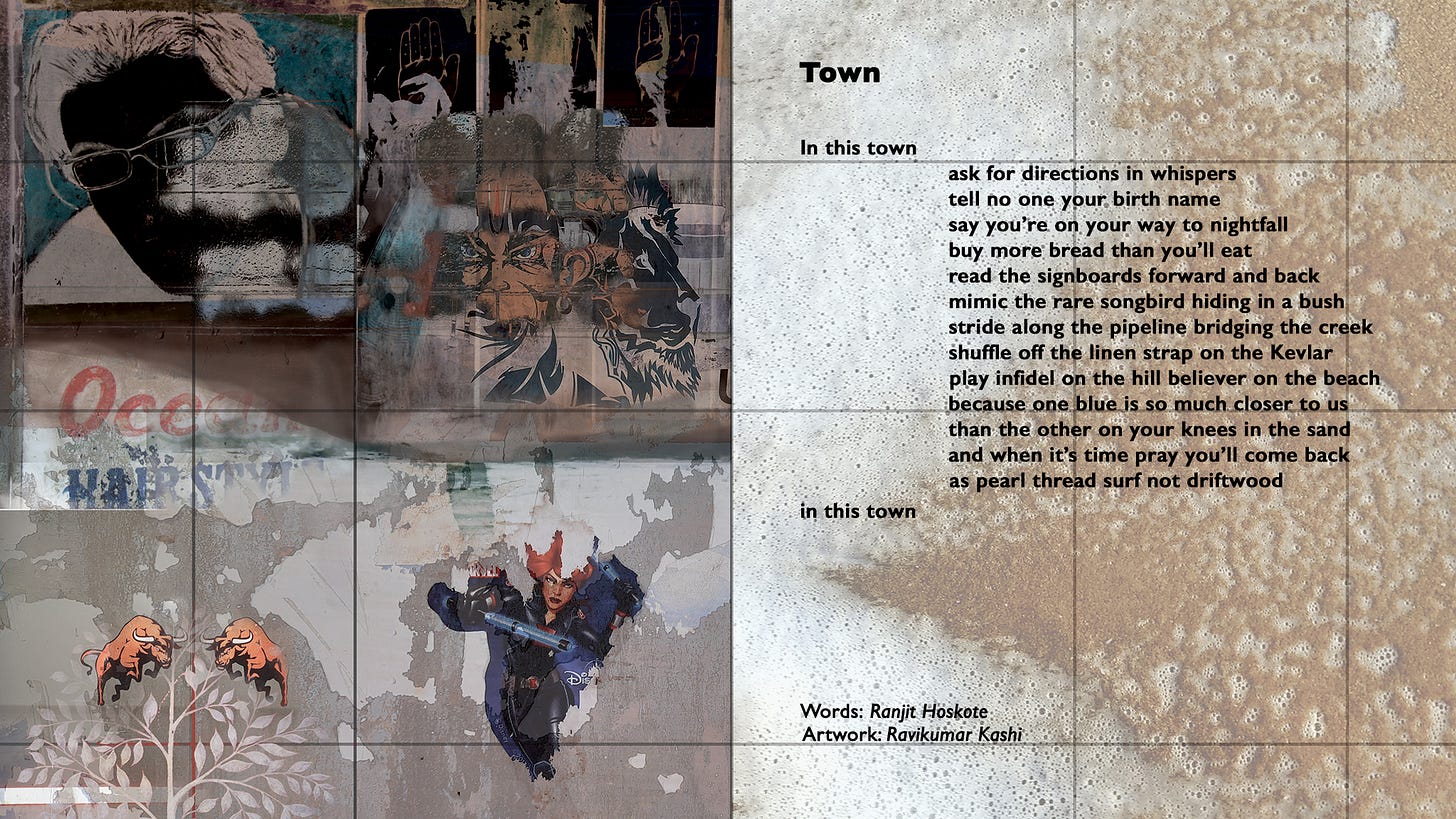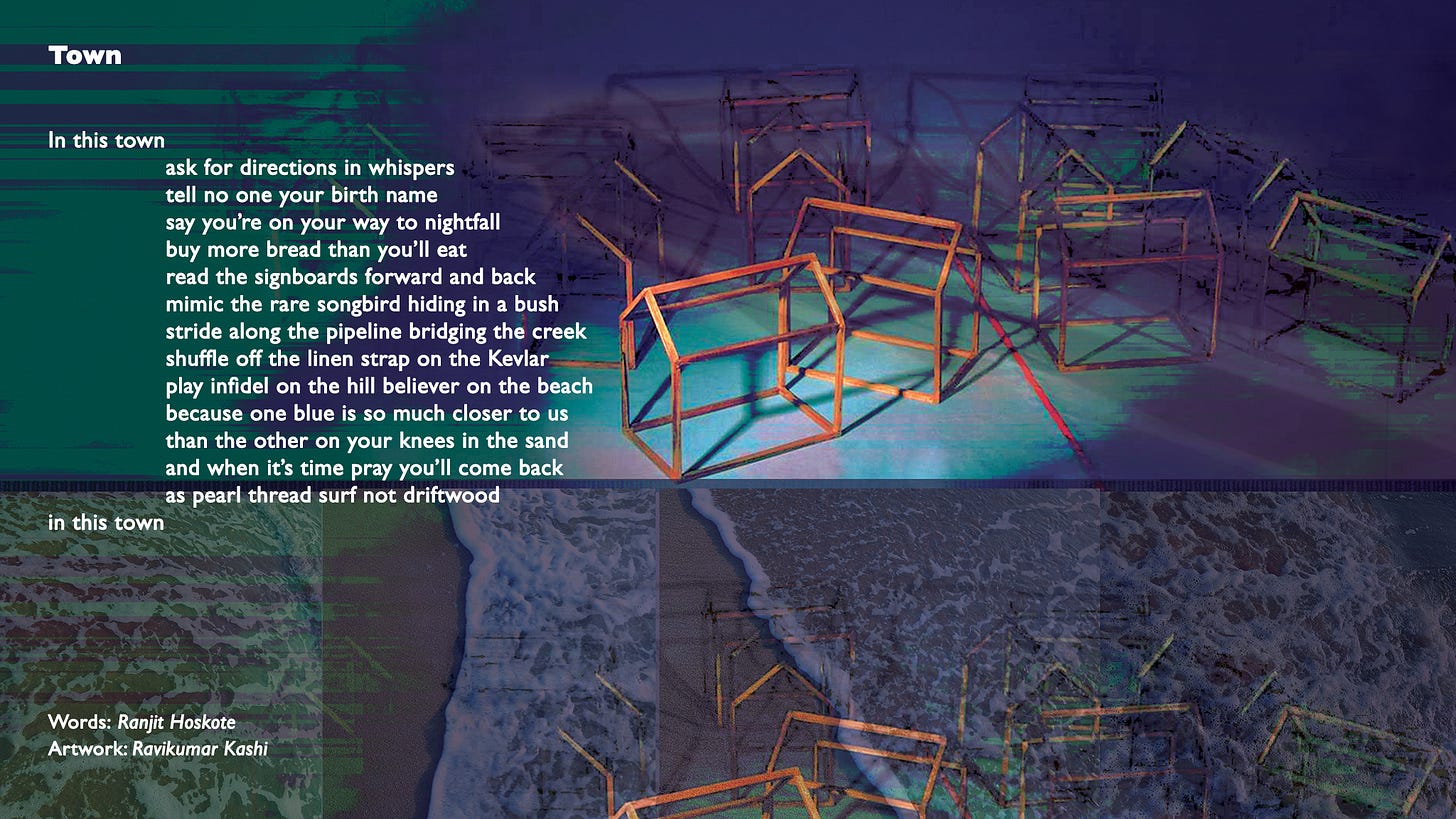I recently discovered the work of the amazing Greek poet Yannis Ritsos . Poetry Foundation quotes Peter Levi’s description of the late poet in the Times Literary Supplement - “his output has been enormous, his life heroic and eventful, his voice is an embodiment of national courage, his mind is tirelessly active.” Perhaps cognitive bias is at play here, but my mind immediately reappropriated parts of this description to the two artists whose work I am finally presenting today as part of the June edition of Voyaging to Innocence. (I apologise once again for the delay in this month’s edition - it was unavoidable)
The June edition of Voyaging to Innocence features a poem by Ranjit Hoskote, visually interpreted by the artist Ravikumar Kashi. “Tirelessly active” is the phrase that stuck in my mind as I thought of both artists - Hoskote’s incredible body of work - translations, literary critique, essays, art writing, cultural theory and, of course, poetry. Ravikumar Kashi’s workshop is an archive of a multitude of different kinds of projects, some finished, some gestating, others incomplete or repurposed. The thing that strikes me about him is that he is always “doing something” - working on something new (or returning with new eyes to the old). The notebooks of these artists, I’m sure, will tell you about this attitude of collecting, documenting and storing away the smallest impressions, the most mundane details, the unfinished, fragmented and the profound.
I thought too about the phrase “the embodiment of national courage”, particularly in the context of the work I’m sharing today. Hoskote’s poem talks to the visceral sense of foreboding and fear that has permeated the political and cultural atmosphere of the country. Our newspapers are overflowing with news of suppression of truth, censorship and the incarceration of artists. To add to the long list of arrests, raids, lynchings, attacks and calls for censorship, our benevolent sarkar has been breathing down Twitter’s neck to take down the accounts of popular cartoonist Manjul, fact-checking website Alt News co-founder Mohammed Zubair and IAS officer Surya Pratap Singh. News items like these are commonplace nowadays. This fear is real. It rests in our bones like the sediment of bad dreams. It permeates the streets, and the dark corners in our homes. The poem “Town” talks to this constant sense of unease:
“ask for directions in whispers
tell no one your birth name
say you’re on your way to nightfall”
There are references to Bombay, and particularly Bandra, in the poem, and that relentless everpresence - the sea. The meandering gaze of the persona seeps through an argument for survival, into the living landscape of the city, and the metaphysical shadow of nature and faith. Despite the continuous undercurrent of anxiety in the poem, the sea in the end gives me some solace. I think even the recording of this moment is a kind of protest, an “embodiment of national courage” even perhaps? After all, what does the nation mean today?
I thought, also, about how this impulse in the face of political uncertainty is similar in some ways to the curse of the pandemic. We are all looking over our shoulders, and tracing our Laxman Rekhas of safety. Ravikumar Kashi’s composed images use various signifiers to highlight this mental landscape. Lines of surf meld with skeletons of homes (that look like barricades), and a fragment of “Angry Hanuman” is juxtaposed with virile bulls and a distorted map. This complex ecosystem comes alive with the cascade of interconnected tableuxs that both artists invoke, and I am left contemplating the nature of power and resistance, and how like the sea, it heaves and sighs, waxes and wanes.
This is the sixth in the series of digital prints featuring artists’ interpretations of 12 different poems by Indian poets (released in monthly editions). This project is conceived as an anthology of digital wallpapers for desktops/laptops combining poetry and visual art. You can find the January edition here, the February edition here, the March edition here, the April edition here, and the May edition here.
Click on the images to properly view, download, and set it as your wallpaper.
The poem Town is part of Ranjit Hoskote’s new collection of poems Hunchprose (New Delhi: Penguin/ Hamish Hamilton, 2021).
This is a fascinating collection of poetry, traversing multiple scapes, and creating new ways of seeing and reflecting upon the fierce wonder of the world we live in.
Ranjit Hoskote can be followed on Instagram here.
You can find Ravikumar Kashi’s work and a public profile here.
Subscribe to the Poetly Newsletter for a regular dose of poetry, art, and commentary in your inbox.




